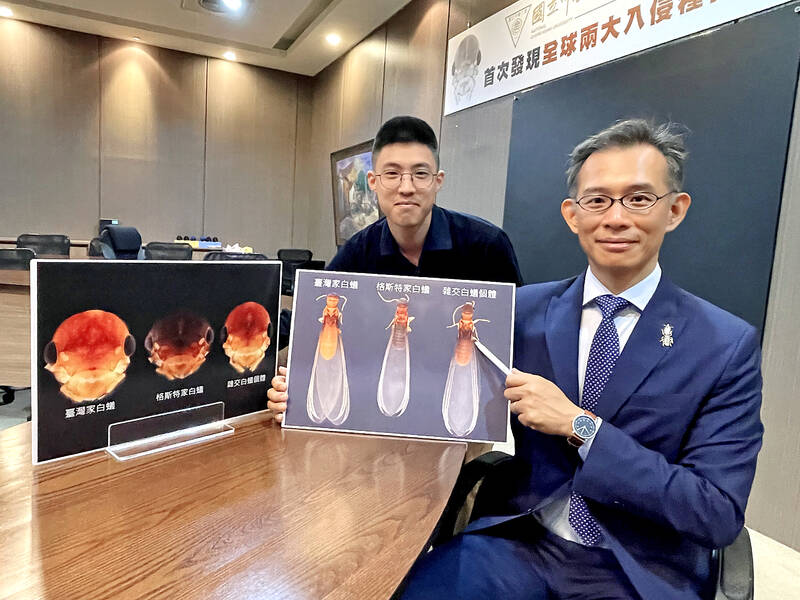A team of Taiwanese and US scientists warned of “super termites” after a three-year study suggested that two destructive subterranean species are producing hybridized offspring in the wild.
This research, which consisted of lab tests and a three-year field study in Taiwan, was published in the March issue of Heredity.
Coauthor Lee Hou-feng (李後鋒), a professor of etymology at National Chung Hsin University, said last week that the research conducted by the team showed that the two common invasive termite species are 100 percent more fertile and resilient to climate conditions.

Photo: Su Meng-chuan, Taipei Times
Taiwanese subterranean termites and Asian subterranean termites are deemed the world’s most invasive termite species, causing economic damage worth tens of billions of US dollars every year, he said.
The University of Florida’s Fort Lauderdale Research and Education Center previously proved via lab tests that the two termite species have the potential to reproduce fertile hybrids, Lee said.
Taiwanese scientists picked up the research since the two species have for centuries coexisted in Taiwan, a unique proximity not duplicated anywhere else in the world, he said.
Working in collaboration with citizen scientists and companies in the pest control industry, The research team between 2019 and 2021 collected numerous samples of flying termites in Taichung, Chiayi and Yunlin, he said.
The team focused their efforts on these jurisdictions because they showed the highest degree of overlap between the two species, Lee said.
An analysis found that 5 percent of the gathered samples display the traits of Formosan and Asia subterranean termites while being of an intermediate color and size, he said.
The superior fecundity and adaptability to humidity and temperature conditions of the super termites might spell trouble for humans, but an accurate risk assessment would require closer observation, he said.

Former president Tsai Ing-wen (蔡英文) on Monday called for greater cooperation between Taiwan, Lithuania and the EU to counter threats to information security, including attacks on undersea cables and other critical infrastructure. In a speech at Vilnius University in the Lithuanian capital, Tsai highlighted recent incidents in which vital undersea cables — essential for cross-border data transmission — were severed in the Taiwan Strait and the Baltic Sea over the past year. Taiwanese authorities suspect Chinese sabotage in the incidents near Taiwan’s waters, while EU leaders have said Russia is the likely culprit behind similar breaches in the Baltic. “Taiwan and our European

Taiwanese indie band Sunset Rollercoaster and South Korean outfit Hyukoh collectively received the most nominations at this year’s Golden Melody Awards, earning a total of seven nods from the jury on Wednesday. The bands collaborated on their 2024 album AAA, which received nominations for best band, best album producer, best album design and best vocal album recording. “Young Man,” a single from the album, earned nominations for song of the year and best music video, while another track, “Antenna,” also received a best music video nomination. Late Hong Kong-American singer Khalil Fong (方大同) was named the jury award winner for his 2024 album

Hong Kong singer Eason Chan’s (陳奕迅) concerts in Kaohsiung this weekend have been postponed after he was diagnosed with Covid-19 this morning, the organizer said today. Chan’s “FEAR and DREAMS” concert which was scheduled to be held in the coming three days at the Kaohsiung Arena would be rescheduled to May 29, 30 and 31, while the three shows scheduled over the next weekend, from May 23 to 25, would be held as usual, Universal Music said in a statement. Ticket holders can apply for a full refund or attend the postponed concerts with the same seating, the organizer said. Refund arrangements would

The Taipei District Court sentenced babysitters Liu Tsai-hsuan (劉彩萱) and Liu Jou-lin (劉若琳) to life and 18 years in prison respectively today for causing the death of a one-year-old boy in December 2023. The Taipei District Prosecutors’ Office said that Liu Tsai-hsuan was entrusted with the care of a one-year-old boy, nicknamed Kai Kai (剴剴), in August 2023 by the Child Welfare League Foundation. From Sept. 1 to Dec. 23 that year, she and her sister Liu Jou-lin allegedly committed acts of abuse against the boy, who was rushed to the hospital with severe injuries on Dec. 24, 2023, but did not